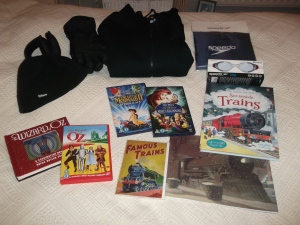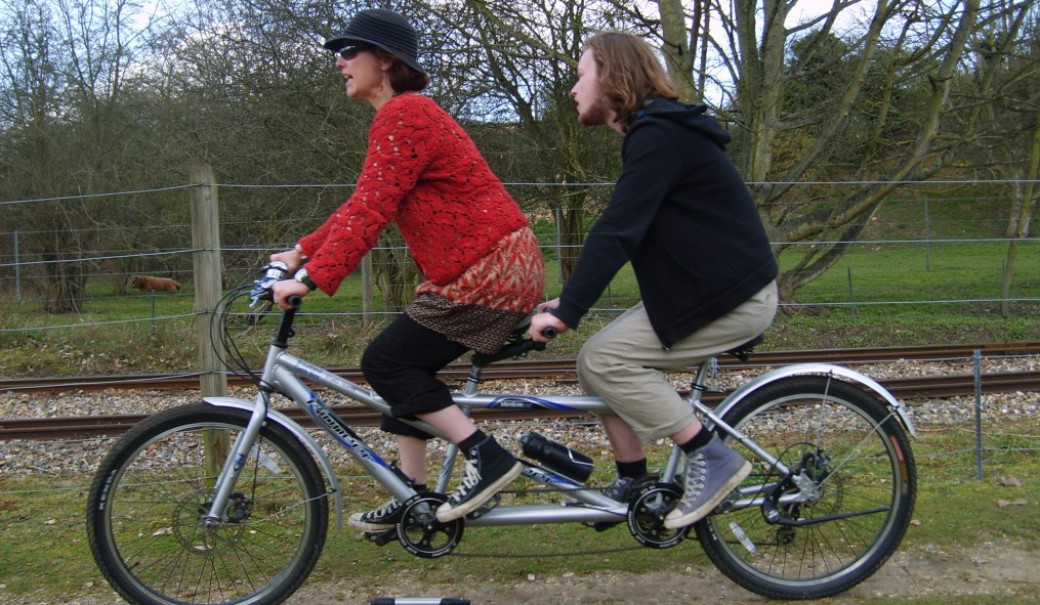 Dylan turned 20 last week. This year his gifts had a sports theme but there were also Disney DVDs and children’s books. Just days before I went birthday shopping I realised that Peter Pan (who has been Dylan’s passion for years) had been replaced in his affections by Ariel. I become so accustomed to Dylan’s heroes that I don’t always notice when they change. Certainly that was the case when Postman Pat gave way to Snow White (who in turn gave way to Peter Pan). However, picking a Little Mermaid book up from Dylan’s bed for the umpteenth time last week, the light dawned.
Dylan turned 20 last week. This year his gifts had a sports theme but there were also Disney DVDs and children’s books. Just days before I went birthday shopping I realised that Peter Pan (who has been Dylan’s passion for years) had been replaced in his affections by Ariel. I become so accustomed to Dylan’s heroes that I don’t always notice when they change. Certainly that was the case when Postman Pat gave way to Snow White (who in turn gave way to Peter Pan). However, picking a Little Mermaid book up from Dylan’s bed for the umpteenth time last week, the light dawned.
Often when I am shopping for Dylan I need to check details with shop assistants. Do these swim goggles have easily-detachable parts? Do you stock Disney versions of the Little Mermaid? Do you have any other Ariel products? When my questioning seems odd I sometimes explain: it’s for my autistic son. In a previous post I’ve reflected on autism and socialisation to gender roles, arguing that gender is not a meaningful concept for Dylan and doesn’t inform his choice of activities. Ariel may not be as boyish as Peter Pan but that doesn’t bother me; I’ve bought plenty of princesses for Dylan over the years. There is a level of awareness of autism now which means that shop assistants have some understanding of this and rarely flinch. However, what I notice does cause consternation is the explanation: it’s for my adult son.
Who Cares?
Some of Dylan’s birthday presents are ones which many men might be glad of. He enjoys being active so sports gifts are not much different than for other 20 year olds. Dylan also has an interest in clothes so it’s possible to buy him fashions from the High Street; Dylan has an array of hats, bags and the latest ear buds, Beats and eye wear just like other young people.
However, if that sack hat were twitched slightly it might expose the name tape stitched into it. And while, in the photo below, Dylan looks like any young man at Camden Lock Market enjoying the Sunday atmosphere, he’s more than likely listening to The Wheels on the Bus or Old MacDonald. Dylan is developing some age-appropriate music preferences but he still chooses nursery rhymes when in need of reassurance and I let him listen to these in potentially stressful places. In this way I encourage Dylan to ‘go undercover’ ; only Dylan and I know of the adaptations made to his clothes and music in order to keep him safe and comfortable. Adjustments such as these are made so that Dylan can blend in with his peer group and not draw attention to himself.
This suggests that the concept of age-appropriate behaviour is something which matters to a group rather than to the individual. There are unwritten codes about what is deemed appropriate behaviour and any person who seems not to be conforming to these codes runs the risk of being reprimanded by the group (through disapproving looks or verbal challenge). It is often peer pressure, then, that directs us towards appropriate ‘norms’ of behaviour based on chronological age.
Act Your Age
For autistic children and adults, particularly where a learning disability is involved, behaviour does not map well onto chronological age. This can be perceived as problematic in a society where ‘grow up’, ‘act your age’ and ‘don’t be childish’ are frequent admonitions. In Western society we do not tolerate those who habitually act as if they were younger than their chronological age (childish), nor do we appreciate adults ‘getting in touch’ with their child in response to a specific incident or experience (childlike). Not only does society not value these qualities, we are actively encouraged to suppress them in order to engage effectively with the demands of education, the work place and social life.
Here I am referring to emotional and social, rather than cognitive, maturity; even if young people struggle in the education system when compared to their peer group, we expect them to be adult in their approach to managing their subsequent employment and family life. There is not much place for the child in our society. Imagine, then, the challenge which a grown man with childlike qualities and behaviours poses to those around him. And for Dylan, the challenge of age-appropriate behaviour is not just emotional and social but cognitive too.
The Age-Related Profile
I don’t like the terms ‘high’ and ‘low’ functioning and I don’t use these labels myself. I’m not a fan of chronological age as a description of intellectual functioning, either, though we use this for educational purposes. On entry to school, and for many years afterwards, teachers reported that they were not able to make reliable assessments of Dylan. More recently, however, they were able to make some measures of his cognitive functioning, reporting it as 2.5 years when Dylan was 14, rising to 4.5 years on leaving school last summer at age 19.
When we use the expressions high and low functioning what we are measuring with is the yardstick of chronological age; a child who is ‘low functioning’ is performing significantly below the level expected for their chronological age. By refusing to use these labels to describe Dylan I am indicating that I find chronological age an unsatisfactory measure of my son’s ability. While I may not like using chronological age-related measures for Dylan however, I recognise him in the description of a child of 4.5 years. Many of the recent developments I’ve observed in Dylan are not unlike those I might expect to see in a child who is getting ready to start school. Dylan is now taking an interest in turn taking games, especially clapping rhymes. His imitation skills have improved and he will fairly reliably copy actions. Some of these skills are precursors of linguistic development and Dylan is, indeed, extending his vocabulary.
Children’s drawings are good indicators of cognitive and social development with clear stages identified in the representation of the human form. When asked to draw a person a very young child will offer, for their first discernible human being, a roundy body with key facial features. Later, the child will add detail but some will not be realistic; the legs which can be seen through clothes for example or shoes at right angles. At this stage, triangular bodies are typical and represent the child’s recognition that people wear clothes rather than walking around naked (the triangle-shape is the dress on a female person). Later, and in line with the child’s cognitive and social development, the human form may be represented in profile. It is only after this (and at the most complex stage of representation) that a child may produce an aerial view of an object.
For Dylan’s birthday last week we went out for a meal. In a lull during service, trying to keep Dylan occupied, I gave him a pen and serviette and asked him to draw a man. This is not something I would normally do with Dylan who has shown no interest, so far, in drawing nor any inclination to hold a pen. However, experience has taught me that all of a sudden things can change and I try to let myself never say Never. Dylan didn’t respond to my request so I drew a circle on the serviette. To my surprise he then added to the circle, in response to my verbal request, eyes, ears, nose, mouth, hair and neck. Voila! On his 20th birthday, Dylan’s first drawing of a person! I was so proud I photographed the fragile corner of serviette.
These behaviours – imitation, turn-taking, clapping games, vocalisation and drawing – are developmental milestones which are described in the child development literature and which could be indicators that Dylan is getting ready to learn. Dylan is still developing and is following many of the standard developmental stages; what is different is that these do not follow the usual trajectory of chronological age. Dylan’s current cognitive functioning appears to be similar to that of a neurotypical child starting school. It is in this sense that I have found the description of Dylan as functioning at 4.5 years helpful; it has enabled me to reflect on Dylan’s progress and think about how I can support him to the next stage.
Spiky Profiles
There are, however, ways in which Dylan’s profile is more complex. Although it can be helpful to think of him as cognitively 4.5 years the fact that Dylan is physically 20 years old influences his developmental path. Dylan’s core emerging vocabulary is not the same as a young child’s, for example, as it includes words which reflect his different preoccupations. While many of his interests are similar to a five year old (especially in relation to books and films) Dylan also makes some age-appropriate film choices, such as Harry Potter and Lord of the Rings, and increasingly age-appropriate music choices. Dylan has what I would call a ‘spiky profile’.
The term ‘spiky profile’ refers to individuals whose achievement varies across a range of different categories. While the spikes are broad and extreme for Dylan due to the gap between his chronological and cognitive age, many of us demonstrate some sort of spikiness. I remember when I was an undergraduate one of my lecturers told me about research she was doing on patterns of achievement at A Level and on graduation from an undergraduate programme. While it was satisfying, she told me, to see consistency in individual profiles (the student who achieved three grade As at A Level and then a First Class Honours degree) this was a rare occurrence. More typically there was no consistency within individual profiles. Her description of these ‘spiky profiles’ influenced my thinking about achievement and has been something I have observed in my own students as well as in my observations of Dylan.
Educational Adjustments
Chronological age is the tool which most societies use to plan for and deliver mass education. A few countries try to take account of the gap between chronological age and achievement by requiring students to repeat chronological age stages which they fail. More commonly, however, children move through the education system in year groups.
When I was training to teach, a mentor told me that the way in which we set ‘norms’ for pupil achievement around chronological age were not only unhelpful but misguided. In the context of a secondary school which used ‘mixed ability’ grouping I was told that if I pitched my teaching down the middle of a group I could be sure to miss everyone in the class. Remember, my mentor told me, that there is no such thing as a 50th centile child. Centiles and norms are statistical calculations, he pointed out, to describe a scatter of points on a graph. The children in my class were scattered all around the 50th centile line bisecting the graph, but none of them actually fell onto the line itself. If I wanted I could go on planning lessons which catered for the ‘norm’, but I needed to be aware that if I did so my lessons would meet no one’s needs. His plea was for me to differentiate my teaching; I needed to individualise my resources, especially for the outlying pupils on the graph. Establishing expectations for children and adults by chronological age and measuring progress against a mean, or norm, hurts everyone, not just those with special needs. However, it is the outlying children who are hurt the most by the tyranny of chronological age.
 Dylan’s particular profile of need means that he is just starting to be ready for school-based learning. Ideally, Dylan would start formal education now, with skilled practitioners who could adapt the primary school curriculum for adult learners. All of the skills Dylan is demonstrating could be exploited for learning through well-judged intervention. Now is the time that Dylan could engage with project work on ‘My Body’ or ‘The Seasons’. Now is when he could be supported to learn makaton signs. A skilled Speech and Language Therapist could probably equip Dylan with a communication system over the next few years. Now would be the time to support him with drawing and making. Now is when Dylan could benefit from joining in group activities, doing class jobs and learning to be part of a community.
Dylan’s particular profile of need means that he is just starting to be ready for school-based learning. Ideally, Dylan would start formal education now, with skilled practitioners who could adapt the primary school curriculum for adult learners. All of the skills Dylan is demonstrating could be exploited for learning through well-judged intervention. Now is the time that Dylan could engage with project work on ‘My Body’ or ‘The Seasons’. Now is when he could be supported to learn makaton signs. A skilled Speech and Language Therapist could probably equip Dylan with a communication system over the next few years. Now would be the time to support him with drawing and making. Now is when Dylan could benefit from joining in group activities, doing class jobs and learning to be part of a community.
I am not arguing for extended state education (though it is a statutory entitlement to 25 years even though few Local Authorities provide it to young people such as Dylan) but rather for a more individualised approach to when education is accessed. Now that Dylan is 20 I wonder whether he might not have been better off in an alternative care setting until adulthood. While other children his age were in school, Dylan might have benefitted more from walking the moors, play and occupational therapy, travel and creative approaches to developing the social and emotional landscape and skills which are precursors for learning. Then, with the development of the skills described here, Dylan could have entered formal education for his 15 years of full time entitlement. The principle of this would be that educational provision is something which we access when we are ready for and can benefit most from it.
In Defence of the Age-Inappropriate
While you couldn’t individualise an education system for everyone there must be some individuals for whom an individualised scheduling of education is possible and desirable. And even if it isn’t possible to customise in quite the way I describe here, there must be a way of reducing the emphasis on chronological age. I have had frequent encounters with well-meaning professionals who express concern at the use of resources which are not age-appropriate. Parents are often discouraged from letting older children and adults engage with materials which are aimed at significantly younger children. While I understand this concern I also know that we learn best when we are motivated.
Dylan is interested in Disney and, at the moment, it is the story of the Little Mermaid which is capturing his attention. At this point in time, this is an appropriate support for Dylan given his emotional, social and cognitive development. So I won’t be preventing him from enjoying his books and DVD – rather I will be encouraging him by offering vocabulary when he asks for it and making links with his own life and the other stories he knows. In time I’ll try to extend his interest; I’m already gently suggesting The Wizard of Oz to him. So if you see me playing counting games or reading Rumble in the Jungle with my 20 year old, don’t condemn me too quickly for not doing age-appropriate activities: consider, instead, that I might be doing Dylan-appropriate things.







Honestly, age-appropriateness is a silly concept. You wouldn’t believe how eager many of my college-age peers are to go see the latest Disney or Pixar film. Once a good excuse presents itself, they jump at the opportunity.
Be careful with Wizard of Oz. My family had a hard time finding toys for my little brother. He loves the movie but the merchandise is geared toward older adults.
LikeLike
ha ha! Yes you’re right. A few years ago I overheard one of my second year undergraduates telling her friends that she had spent £250 of her student loan on My Little Ponies! I thought the fact The Wizard has real people in might extend Dylan a little but he hasn’t shown any interest in it yet 🙂
LikeLike
Happy Birthday! I am 48 and “NT” I would love all those gifts and cake as well. I teach social and communication skills to college students (18-26) who are on the spectrum. The idea about age-appropriate hobbies, games, books and interests is sill, I agree. Enjoy your life and as Dylan learns and makes new friends he will find all kinds of additional interests.
LikeLike
Hi Mike – thanks for reading and for your comment. One of my students told me the other day that she would love all those gifts too 🙂 Your job sounds interesting – but I’m guessing you are maybe in America… Liz
LikeLike
I love this so much! My boys are 12 & 9 and I want to keep this post in mind as the age gap continues to widen through the teenage years. (I also hope that one day we will ride a tandem bike together)
LikeLike
Thank you! And the tandem is huge fun – I hope you get the chance!
LikeLike
You are an amazing and inspiring mother! The understanding you show your son is to be commended and Dylan is a VERY lucky young man! My 18 year old has Asperger’s Syndrome and has typically had what would be considered age appropriate or even above age interests (at 7 his hyperfocus was Canadian geography) But my 16 yr old with ADHD tends toward things most think as “too young”. It’s becoming more acceptable to keep an interest in Disney or super heroes so that’s less an issue but he takes a fair amount of guff for his intense love of Pokemon. But he is really into it. As you have seen with your son, supporting what they care about helps them develop at the rate they need to. Each child is an individual. Special needs moms and dads learn this and I think too often the rest of society doesn’t get it like we do. I wish you and Dylan the best! Of course he already has the best in a wonderful mom like you!
LikeLike
Hello Jennifer – thanks for reading and for this lovely affirming comment. It’s very much appreciated. I can quite understand the attraction of Pokemon 🙂 You sound like a lovely mum yourself! All the best with your boys, Liz
LikeLike
This was such a pleasure to read. I am autistic myself – HFA – and no body kicks me around for being ‘immature’ ‘unsophisticated’ and ‘uncritical’ more than I do myself.
Just a note, as I understand it, ‘High-functioning’ generally describes someone who can to at least some degree, independently interact and function in society.
LikeLike
Hi – thanks for reading – I’m glad you enjoyed it. And thanks for your note about HF. Yes, you’re right about that. I think what I had in mind was that our measures of independence (or lack of it) are age-related. But, yes, we use HF and LF to indicate someone’s ‘place’ on the spectrum, i.e. when measured against other autistic people (rather than against chronological age). I suppose that establishes a ‘norm’ of autistic-functioning, rather than age-related functioning, against which we measure people 😦 Thanks for pointing that out – good to hear from you. Liz
LikeLike
Hi there, Coyote Without A Map.
I have some rather unusual interests myself, and don’t really get kicked around for it, either. The only thing that I’ve never done that’s really considered “grown up” is become involved wholesale in the burning-hot, high-flown, lofty, noble causes of the day, much to the chagrin and resignation of my family, but they’ve come to accept that.
LikeLike
I have just today found your blog and intend to read thoroughly and often, so I haven’t yet seen past this entry. I am heartened to see reference to gender and our children “arguing that gender is not a meaningful concept for Dylan and doesn’t inform his choice of activities. ” My son is 9 and at this stage in life at a level slightly above where your described Dylan as being. Hunter(my son) has basic command/request language, is very recently toilet trained and seems to function at an average of 2.5 years (task dependent) Hunter has no concept of gender, he doesn’t know boys from girls male from female. He will happily choose pink over blue, my little ponies over cars and trucks and Dora over spiderman. Have you written any further on gender topics or ideas as they relate to parents such as us?
LikeLike
Hi there – thanks for reading and for saying hello. I recognise your description of Hunter’s choices! I remember the first time I let Dylan choose his own t-shirt in a shop (not that long ago – probably around 16 years) being surprised when he picked out hot pink and purple. Actually, I think Dylan likes pink – I let him choose a new case for the camera the other day and again he chose pink 🙂 I’ve written a little about gender in my post Is My Autistic Boy My Son? You can click the link or get there via the contents page on my site. I’ve also got a ‘Gender’ tag in my ‘themes cloud’, though my tagging isn’t always great 🙂 Hope this is useful and that you find other things on the site that resonate for you and Hunter. Liz
LikeLike
Dylan is so so lucky to have you.
My granson is 5 and is in the autism spectrum disorder he is such a beautiful boy
Loving and kind. We to worry about his future it hard to cope. There is little or no support in Ireland we are involved in a family support group called Snowflakes they are great help Autism in this country is not regarded as something that needs special attention.
LikeLike
Hi there – thank you for saying that. We are our children’s greatest support potentially – and your grandson is lucky to have you. But we need support don’t we. Actually, I’ve had a terrible week one way and another – knock backs, difficulties, problems with Dylan’s care. I’m in Sheffield and believe me you wouldn’t want to live here – it is truly dreadful, at least for someone presenting with Dylan’s level of need. And as yet I’ve had no significant support from education, health or social care (particularly since Dylan became an adult). Periodically I consider moving across the border to a neighbouring authority which is reputed to be better. And it is this lack of support that can wear us down. So it’s great to hear of Snowflakes – similarly here, the only support is that which parents and families give to each other. Ireland interests me. The blog gives me some broad information about where my posts are being viewed and I seem to get a lot of interest from Ireland – of course it could be a few people viewing often rather than lots of people, but it’s very noticeable. So I’ve wondered about incidence of autism and provision in Ireland. It’s good to hear from you and my very best wishes to you and your family. Liz
LikeLike
Pingback: The Emptying Nest: autism and leaving home | Living with Autism
Pingback: Why Doesn’t My Autistic Son Cry Tears? | Living with Autism
Pingback: Ways Of Drowning: water, autism, the sea etc. | Living with Autism
Pingback: Ways Of Learning: examples from a home education programme | Living with Autism
Pingback: Learning Through Dialogue: reflections on blogging (ii) | Living with Autism
My son, Jerry, does not have autism although most people who meet him assume that he does. He has Williams Syndrome. I could swap his name for Dylans and he is 18 rather than 20 but you could be telling Jerry’s story here. I love the term spiky profile……. I’ll have to use it…..
How wonderful would it be if we could allow our kids the time to develop all the things they need in order to learn before putting then in an education system ill-equipped to teach them. Thank you for sharing.
LikeLike
Hello Teresa – thank you for reading and for commenting. Interesting that my description of Dylan reminds you of Jerry. I don’t think I’ve ever met anyone with a Williams diagnosis although I am vaguely aware of it – I will google it, having read your comment, and find out more. I wonder how it must feel to have people label your son autistic when that is not the actual diagnosis. I’m never sure how I feel about the label even though I accept it as a ‘useful enough’ description of Dylan. He is 21 now (I wrote that post about age a while ago) and doing really well at the moment – still into Peter Pan of course 🙂 I am even more convinced, now, that some children would be happier and benefit more from a differently-staged education provision. All the best for the future to Jerry 🙂
LikeLike
Pingback: Day 51: On Hold | Living with/out Autism
Great post. I can relate. My daughter is 12 but still prefers toys and books and music kids younger than her enjoys. For her it’s neat because she gets along better with the younger group with makes her happy. I used to have a difficult time with accepting what I was seeing. We are out tonight and she’s pushing around a stroller with a baby in it. I do find school has a hard time dealing with the issue themselves.
LikeLiked by 2 people
My son who is 12 still enjoys the same books, movies and toys since he was 2 years old. I enjoy them right alongside with him. I take that opportunity to help increase more vocabulary. I do have family members tell me that I should stop buying him these things and just by him age appropriate things. I tell them you don’t live in my home and don’t know what living with autism is like. I am not going to stop buying him the things he loves and enjoys just because society doesn’t agree.
LikeLiked by 1 person
Good for you 🙂 I wrote that post a little while ago but it all still holds true and my son is still enjoying the same books and films – like you I enjoy them with him. All the best to you, thanks for reading…
LikeLiked by 1 person
Hey, i think this story is beautiful and inspiring, my 5 year old son is on the spectrum,
Thankyou for sharing your sons lovely story 😚
LikeLiked by 1 person
Thank you for reading – all the best to you and your son 🙂
LikeLike
So glad to have read your story about your son, my son sounds almost exactly the same. He is turning 21 soon and he too is really ready to learn, I often say that there’s is so a hype about early intervention, but for my son he was so not interested in learning as a young child.
LikeLiked by 1 person
Exactly! I’m just back from spending a 10 day holiday with Dylan, now 24, and have been so impressed by how much he continues to learn and develop. Good luck and enjoy the years ahead with your son…
LikeLike